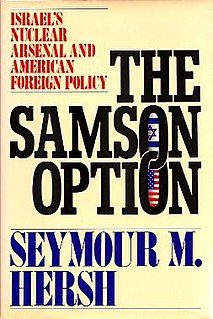The Iraqi National Congress is an Iraqi political party that was led by Ahmed Chalabi who died in 2015. It was formed as an umbrella opposition group with the aid and direction of the United States' government following the Persian Gulf War, for the purpose of fomenting the overthrow of Iraqi President Saddam Hussein.

George W. Bush's tenure as the 43rd president of the United States began with his first inauguration on January 20, 2001, and ended on January 20, 2009. Bush, a Republican from Texas, took office following a narrow victory over Democratic incumbent vice president Al Gore in the 2000 presidential election. Four years later, in the 2004 presidential election, he defeated Democrat nominee John Kerry to win re-election. Bush was succeeded by Democrat Barack Obama, who won the 2008 presidential election. Bush, the 43rd president, is the eldest son of the 41st president, George H. W. Bush.

Paul Dundes Wolfowitz is an American political scientist and diplomat who served as the 10th President of the World Bank, U.S. Deputy Secretary of Defense, U.S. Ambassador to Indonesia, and former dean of Johns Hopkins SAIS. He is currently a visiting scholar at the American Enterprise Institute.

Richard Norman Perle is an American political advisor who served as the Assistant Secretary of Defense for Global Strategic Affairs under President Ronald Reagan. He began his political career as a senior staff member to Senator Henry "Scoop" Jackson on the Senate Armed Services Committee in the 1970s. He served on the Defense Policy Board Advisory Committee from 1987 to 2004 where he served as chairman from 2001 to 2003 under the Bush Administration before resigning due to conflict of interests.

Douglas Jay Feith served as the under secretary of Defense for Policy for United States president George W. Bush, from July 2001 until August 2005. He is a senior fellow at the Hudson Institute, a conservative think tank.

Seymour Myron "Sy" Hersh is an American investigative journalist and political writer. He was a longtime contributor to The New Yorker magazine on national security matters and has also written five articles for the London Review of Books since 2013.

John Dimitri Negroponte is an American diplomat. He is currently a James R. Schlesinger Distinguished Professor at the Miller Center for Public Affairs at the University of Virginia. He is a former J.B. and Maurice C. Shapiro Professor of International Affairs at the George Washington University's Elliott School of International Affairs. Prior to this appointment, he served as a research fellow and lecturer in international affairs at Yale University's Jackson Institute for Global Affairs, United States Deputy Secretary of State (2007–2009), and the first ever Director of National Intelligence (2005–2007).

William Scott Ritter Jr. is a former Marine Corps intelligence officer who served with the United Nations implementing arms control treaties, with General Norman Schwarzkopf in the Persian Gulf during Operation Desert Storm, and in Iraq, overseeing the disarmament of weapons of mass destruction (WMD), as a United Nations weapons inspector, from 1991 to 1998. He later became a critic of United States foreign policy in the Middle East. He is a convicted child sex offender for unlawful contact with a minor, criminal use of a communications facility, corruption of minors, indecent exposure, possessing instruments of crime, and criminal solicitation.

The Director of Central Intelligence (DCI) was the head of the American Central Intelligence Agency from 1946 to 2005, acting as the principal intelligence advisor to the President of the United States and the United States National Security Council, as well as the coordinator of intelligence activities among and between the various U.S. intelligence agencies.

During the early stages of the Iraq War, members of the United States Army and the CIA committed a series of human rights violations and war crimes against detainees in the Abu Ghraib prison in Iraq, including physical and sexual abuse, torture, rape, sodomy, and the killing of Manadel al-Jamadi. The abuses came to public attention with the publication of photographs of the abuse by CBS News in April 2004. The incidents caused shock and outrage, receiving widespread condemnation within the United States and internationally.

The Bureau of Intelligence and Research (INR) is an intelligence agency in the United States Department of State. Its central mission is to provide all-source intelligence and analysis in support of U.S. diplomacy and foreign policy. INR is the oldest civilian element of the U.S. Intelligence Community and among the smallest, with roughly 300 personnel. Though lacking the resources and technology of other U.S. intelligence agencies, it is "one of the most highly regarded" for the quality of its work.
Ronald Ian "Ron" Spiers was an American diplomat who served as an Ambassador to several countries during the 1970s and 1980s.
The Niger uranium forgeries were forged documents initially released in 2001 by SISMI, which seem to depict an attempt made by Saddam Hussein in Iraq to purchase yellowcake uranium powder from Niger during the Iraq disarmament crisis. On the basis of these documents and other indicators, the governments of the United States and the United Kingdom asserted that Iraq violated United Nations sanctions against Iraq by attempting to procure nuclear material for the purpose of creating weapons of mass destruction.

Robert G. Joseph is a senior scholar at the National Institute for Public Policy and professor at Missouri State University. He was the United States Special Envoy for Nuclear Nonproliferation, with ambassadorial rank. Prior to this post, Joseph was the Under Secretary of State for Arms Control and International Security, a position he held until January 24, 2007. Joseph is known for being instrumental in creating the Proliferation Security Initiative and as the architect of the Global Initiative to Combat Nuclear Terrorism. He was also the US chief negotiator to Libya in 2003 who convinced the Libyans to give up their WMD programs. He also recently authored a book describing his experience in negotiating with Libya entitled "Countering WMD."
Richard Barlow is an American intelligence analyst and a former expert in nuclear non-proliferation for the US Arms Control and Disarmament Agency, the Central Intelligence Agency, and the Department of Defense. He lost his job and was subjected to a campaign of persecution and intimidation after he expressed concern to his managers in the US Department of Defense over testimony to congress that he believed to be false about Pakistan's nuclear weapon program during the presidency of George H. W. Bush. Since then, he has had occasional contract work for various federal agencies including the CIA, the State Department, the FBI and Sandia National Laboratories. In 2013 he had been unemployed since 2004 when his job at Sandia had been eliminated. "If they had busted those [Pakistani] networks," he told journalist Jeff Stein, "Iran would have no nuclear program, North Korea wouldn't have a uranium bomb, and Pakistan wouldn't have over a hundred nuclear weapons they are driving around in vans to hide from us."

The rationale for the Iraq War, both the 2003 invasion of Iraq and the subsequent hostilities, was controversial because the George W. Bush administration began actively pressing for military intervention in Iraq in late 2001. The primary rationalization for the Iraq War was articulated by a joint resolution of the United States Congress known as the Iraq Resolution.
Ari Ben-Menashe is an Iranian-born Israeli-Canadian businessman, security consultant, and author. He was previously an employee of Israel's Military Intelligence Directorate from 1977 to 1987, and an arms dealer. He lives in Montreal, Quebec, Canada and runs an international commodity exporting firm, Traeger Resources and Logistics Inc.

The State of Israel is widely believed to possess nuclear weapons. Estimates of Israel's stockpile range between 80 and 400 nuclear warheads, and the country is believed to possess the ability to deliver them in several methods, including by aircraft, as submarine-launched cruise missiles, and via the Jericho series of intermediate to intercontinental range ballistic missiles. Its first deliverable nuclear weapon is thought to have been completed in late 1966 or early 1967; which would make it the sixth country in the world to have developed them.

The Samson Option: Israel's Nuclear Arsenal and American Foreign Policy is a 1991 book by Seymour Hersh. It details the history of Israel's nuclear weapons program and its effects on Israel-American relations. The "Samson Option" of the book's title refers to the nuclear strategy whereby Israel would launch a massive nuclear retaliatory strike if the state itself was being overrun, just as the Biblical figure Samson is said to have pushed apart the pillars of a Philistine temple, bringing down the roof and killing himself and thousands of Philistines who had gathered to see him humiliated.
The cruise missiles strike on Iraq in June 1993 were ordered by U.S. President Bill Clinton as both a retaliation and a warning triggered by the attempted assassination by alleged Iraqi agents on former U.S. President George H. W. Bush while on a visit to Kuwait from 14–16 April 1993.














